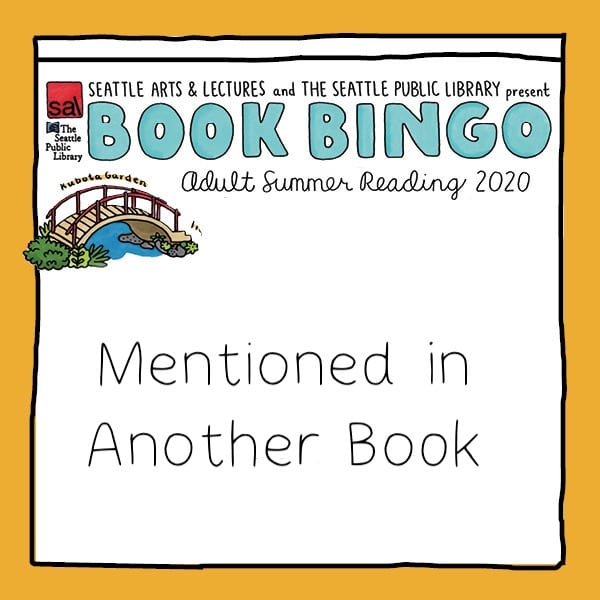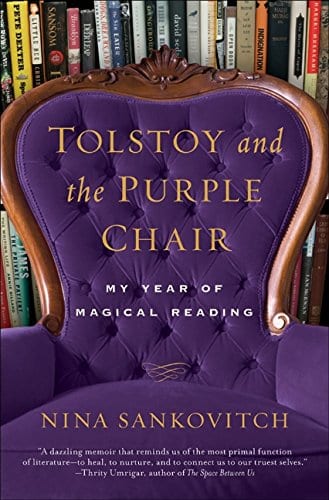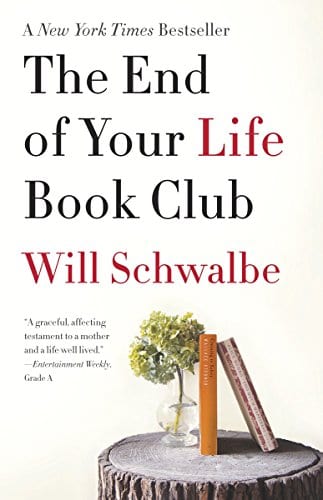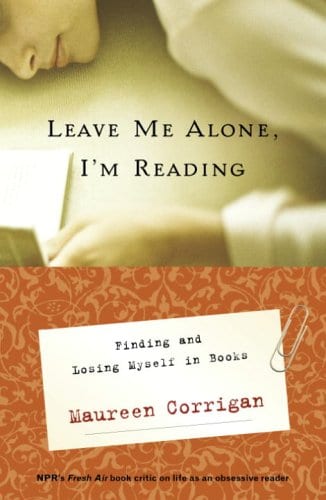
2020 Summer Book Bingo: Mentioned in Another Book
August 17, 2020
Our volunteers love to read and play Summer Book Bingo, our free summer reading program with The Seattle Public Library, as much as we do! Download your card here. Engage with other bingo players and find out their own reading adventures by using the hashtag #BookBingoNW2020 on social media.
Mary Kay Feather has volunteered for SAL for over thirty years! If you’ve been to a SAL event, then you have likely seen her. Not surprisingly, she’s an avid reader, too. Below, she shares one of her favorite Summer Book Bingo categories this year with some meta-recommendations for books on books.
Books Spawn Books
By Mary Kay Feather, SAL Volunteer
SPL’s webpage for Summer Book Bingo had my name on it because, over the years, I’ve been collecting a category of books known as “books on books.”
Sitting in my easy chair with a homemade double latte like the Seattle native I am, I have a stack of books on books in front of me. Immediately, I am distracted by reading title descriptions in one of them. Nick Hornby writes in August 2006, “It’s been an unsettling couple of months,” and he’s only talking about a hankering to live in Oxford, Mississippi. What is he saying about recent months in the pandemic? Now, he must stay sane without football, but he’s stockpiled a few books.
In a collection of reviews from the Believer Magazine by Hornby called Ten Years in the Tub, Hornby breaks each essay into two parts: “Books I Bought” and “Books I Read.” He manages to encompass a plethora of titles in these two categories, as well as brief reviews. He’s funny, incisive, and a man of many interests beyond music and rugby. If, like me, you buy to add to your collection but don’t always get to reading such purchases the same month (or even year), you’ll appreciate Hornby’s scattershot means of deciding on his next read.
Hornby is also keen on rediscoveries and lots of non-fiction. For instance, he reviewed a Norman Lewis memoir (Naples ’44: An Intelligence Officer in the Italian Labyrinth) about deprivation in Allied-occupied Italy, along with The Perfect Thing: How the iPod Shuffles Commerce, Culture and Coolness in the same article. And I want to read both. That is the draw with Hornby. Or he offers a quick quote: “Tony Hoagland is the sort of poet you dream of finding, but almost never do.” Or, he tosses in a comment on movies or YA books, all in five or six pages of clever enticing book talk, and you, too, add to your own “books bought” list or place another hold at the library. He’s a convert to the Northwest, having “bought A Complicated Kindness (Miriam Toews) in the Powell’s bookstall at the Portland, Oregon airport, after several fervent recommendations from the Powell’s staff.” He swells our PNW bookish pride: “Did you know that you have the best bookshops in the world? I hope so. Over here in England, the home of literature, ha-ha, we have only chain bookstores.”
Next on my list is novelist and short story writer Peter Orner’s Am I Alone Here? Notes on Living to Read and Reading to Live, catalogued as essays and memoir. Each chapter presents an author and book charmingly illustrated by his brother, and what it means to him. He frames the title with stories of his life: his failed marriage, his beloved daughter, his dad who died at the age of seventy-eight, and reminds us of how literature can comfort in times of heartache and loneliness. “I’m a Jewish kid from Chicago, but without Anton Chekhov, without Isaac Babel, without Eudora Welty, without Juan Rulfo, without John Edgar Wideman . . . I’m not sure I’d have any clue at all who I am.” The bulk of his references cite classic short stories (Bellows, Berriault, Boll, Cheever, Bausch, Dubus, Gallant, Welty) and one poet (Herbert Morris), along with a wonderfully detailed notes section at the end of the book with further offerings. I just read the Welty recommendations.
And, finally, there’s Washington Post Book Critic Michael Dirda’s collection, Bound to Please: An Extraordinary One-Volume Literary Education. Divided into twelve sections, he manages to tuck history, biography, letters, fiction (including classic SciFi, fantasy, and mystery), into a “literary cocktail party . . . a way to catch up with old friends and make new ones.” Whether he is describing Chester Himes’ key American novels, a biography of Bruce Chatwin, or Crime and Punishment, Dirda has our ear with his witty recaps, and we want to read what he’s read. In discussing Madame Blavatsky’s Baboon, a book on spiritualism, Dirda writes: “Compared with the evil or dopey pseudo-religions of today, the Theosophists seem a kinder, gentler cult (and) exhibit an old-fashioned looniness.” My paternal grandma was a Theosophist who haunted the Christian Science bookstore—it all links to the personal. Dirda ends with a bouquet of reading lists.
Prominent local versions of this tempting reading category come from Nancy Pearl and her Book Lust series, or her latest volume, The Writers Library, written with Jeff Schwager. Others include My Ideal Bookshelf by Jane Mount and Thessaly La Force, Tolstoy and the Purple Chair by Nina Sankovitch, The End of Your Life Book Club by Will Schwalbe, and Leave Me Alone, I’m Reading: Finding and Losing Myself in Books by NPR’s Maureen Corrigan.
Seeking more books on books? Check out this link.
Mary Kay Feather is a beloved SAL volunteer and an active traveler who was featured on Faces of SAL a few year ago. Read more here.


